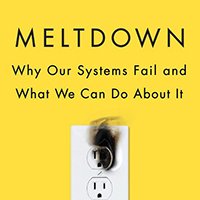Indexes - all Resources

It’s all about me: narcissistic chief executive officers and their effects on company strategy and performance. (2007)
"Narcissistic CEOs favor bold actions …, resulting in big wins or big losses, but their firms' performance is generally no better or worse than non-narcissistic CEOs’ firms. Arijit Chatterjee and Donald C. Hambrick, Pennsylvania State University Administrative Science Quarterly, Vol. 52, No. 3 (Sep., 2007), pp. 351-386 This study uses unobtrusive measures of CEOs’ narcissism to examine its effect on a firm's strateg...
Written by: Chatterjee, Arijit & Hambricj, Donald C.
Read more
The fallout of CEO narcissism. (2014)
"Highly narcissistic CEOs may tend to do the opposite of what other directors have experienced to demonstrate their superiority. The researchers analysed the relationship between narcissism Guoli Chen, INSEAD Assistant Professor of Strategy David H. Zhu, Assistant Professor of Management, Arizona State University Published in INSEAD’s online magazine ‘Knowledge’,...
Written by: Chen, Guoli and Zhu, David.
Read moreThe right incentive structure makes firms smarter. (2017)
“As a firm's dependence on a single leader increases, so does the likelihood that the leader will begin to display overconfidence…” Guoli Chen, INSEAD Associate Professor of Strategy 1 March 2017 Article based on a paper written with Heli Wang, Lee Kong Chian School of Business, Singapore Management University; and Shan Zhao, Grenoble Ecole de Management To be published in ...
Written by: Chen, Guoli; Wang, H. & Zhao, S.
Read more
CEO hubris as a ‘sell’ signal for investors. (2013)
"We could analyze the speech patterns of corporate and government leaders and measure whether they have stepped over the edge of narcissism and lost touch with the realities of their business Art Chester, former research scientist, CTO and lab president. Personal blog Artchester.net, 27 September 2013 It’s a ‘science fact’ that CEO hubris may predict bumpy times ahead for shares in the company they lead, w...
Written by: Chester, Art
Read moreHow having power is like having brain damage: a new book explains why systems fail (2018)
'Meltdown. Why our systems fail and what we can do about it', Clearfield, C., & Tilcsik, A. Atlantic Books, 2018. Excerpt via The Star, 1 April 2018. A new book, titled 'Meltdown' aims to look at the complexity of "failures", from catastrophic disasters, to mundane mistakes, and how their commonality can be dealt with in order to avoid future ordeals. "...Neuroscience shows that [a] desire for conformity isn’t just ...
Written by: Chris Clearfield & Andras Tilcsik
Read moreMale and female bosses share the same “classically masculine” personality traits (2018)
"...It remains the case that stereotypically masculine traits predict the attainment of senior roles among men and women." Dr Christian Jarrett, Cognitive Neuroscience, University of Manchester Research Digest, The British Psychological Society, 8 March 2018 Image: pixabay.com Dr Jarrett asks whether "...women who reach senior management tend to share the traits of men in ...
Written by: Christian Jarrett
Read moreEpistemic vices in organizations: knowledge, truth, and unethical conduct (2018)
The conviction that one has authority or superiority where one in fact lacks it is a sign of epistemic hubris, and business leaders who possess this trait "indulge in a kind of delusional cognitive omnipotence." Baird, C. and Calvard, T S. Journal of Business Ethics, 1-14 The authors aim to draw new paths in "reevaluating the business ethics of truth, knowledge, and knowing", by combining aspects of the virtue of...
Written by: Christopher Baird, Thomas S Calvard
Read moreWhen you believe your own PR . . . Leaders must be able to spot the signs that they are becoming far too egotistical. (2014)
“The key for executives is to start thinking about their vulnerability to hubris before it sets in, giving them time to understand what scenarios could increase that vulnerability and what warning signs there might be. Carly Chynoweth The Sunday Times (online) Published: 19 October 2014 “Narcissism is like salt in soup: a pinch or two improves matters but add too much and the whole thing is ruined. Unfortunately for ...
Written by: Chynoweth, Carly.
Read moreA politician’s guide to handling hubris – radio clip. (2015)
“You have to avoid hubris, triumphalism… you’ve only got two or three years and after that you do lose the plot… (after our victory) in 1987 we thought it was a triumph and hubris did take over.” Kenneth Clarke Kenneth Clarke, former Chancellor in UK Conservative Party Prime Minister Margaret Thatcher’s government. Alastair Campbell, Director of Communications and Strategy for former UK Labour Prime Minister...
Written by: Clarke, Kenneth and Campbell, Alastair.
Read moreBig Egos Can Be Green: A Study of CEO Hubris and Environmental Innovation (2017)
"CEOs’ hubris may provide the required force for overcoming obstacles to the development and introduction of green innovations." Arena, C., Michelon, G. and Trojanowski, G. (2017), Big Egos Can Be Green: A Study of CEO Hubris and Environmental Innovation. British Journal of Management. doi: 10.1111/1467-8551.12250 "Hubristic CEOs are usually impulsive and restless individuals affected by hyper-levels of self-evaluation,...
Written by: Claudia Arena, Giovanna Michelon and Grzegorz Trojanowski
Read more











